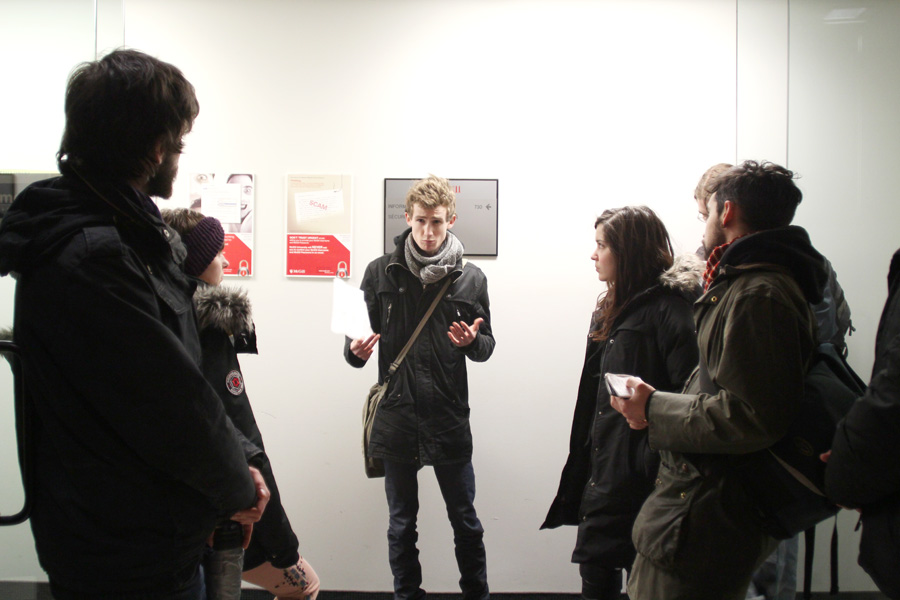On Mar. 14, a dozen McGill students and recent graduates gathered outside the Students’ Society of McGill University (SSMU) Building to participate in the Military Research Walking Tour.
The walking tour was organized by Demilitarize McGill, a student-run group aimed at ending military research at the university. Kevin Paul, a first year law student and member of Demilitarize McGill, led the hour-long tour which covered three locations on campus, including the Institute of Air and Space Law, the Macdonald Engineering Building, and the seventh floor of the 688 Sherbrooke building.
According to Paul, the purpose of the event was to spread awareness about McGill’s academic and financial participation in military research.
“[We want to] share information on what connections McGill has to weapons development in a way that addresses the lack of transparency the university has shown,” Paul said.
The tour’s first stop was the Institute of Air and Space Law, where Cadence O’Neal, U0 women’s studies, spoke about a collection of law school graduates’ theses which thank the U.S. Air Force for funding their education at McGill.
“We do know some things for sure,” O’Neal said. “These military organizations are paying for their members to come study here and produce academia that they can use to further their own interests. It is unacceptable to me, and to Demilitarize McGill, that our university is instrumental in the production of these laws that serve these institutions.”
Isaac Stethem, who graduated from McGill with an arts degree earlier this year, discussed the denied ATI requests made by students—including some Demilitarize McGill members—to the university on various subjects.
“It’s not just that those 14 people—or anyone they can be associated with—who can’t file any more [ATI] requests, but also the McGill Daily and The Link,” Stethem said.
SSMU Vice-President External Robin Reid-Fraser is one of the 14 students who filed an ATI request. She said she is not satisfied with some of McGill’s reasons for denying her ATI request, which concerns military research at the university.
“Part of the excuse [McGill is] making is that answering all these [ATI] requests requires a large amount of resources, and basically, it’s impossible for them to function because they have all this extra work due to these requests,” Reid Fraser said.
After visiting the Institute of Air and Space Law, the tour walked to a basement lab in the Macdonald Engineering Building, where the topic of discussion was the Faculty of Engineering’s history in military research dating back to the 1960s, as well as their alleged lack of transparency about weapons development. Today, the Shock Wave Physics Group and Computational Fluid Dynamics (CFD) Lab are two McGill groups which still engage in aircraft engineering and the study of detonation phenomena.
A statement on the CFD Lab website does not mention involvement or funding from the military.
“The primary objective of the McGill CFD Lab is to develop advanced numerical technologies in multidisciplinary aerodynamics in order to allow for an integrated aircraft design approach through concurrent engineering,” the website states. “Research funding is primarily contributed by the federal as well as the provincial governments through the following agencies: NSERC, CFI, FQRNT; and industries such as Bombardier, Pratt & Whitney, Bell Helicopter, and a large number of private companies.”
Demilitarize McGill claims that much of their research benefits military endeavours.
“At this moment, McGill is developing the technologies that the U.S. military will use to kill more efficiently, at the same time as profiting from various military interventions which mean new research opportunities for the CFD Lab and the Shock Wave Physics Group,” said Paul.
The tour ended at 688 Sherbrooke, where discussion turned to drone research.
“Through the industry-sponsored CFD Lab, McGill is involved in the development of technology for lethal attack drones, which are being deployed by the United States in an increasingly borderless war with no end in sight,” said Paul.
Paul emphasized Demilitarize McGill’s mandate, which is to end weapons research at McGill.
“Allowing military research at McGill to continue means allowing the university to remain complicit in war. We don’t need a policy review or a consultation forum, we don’t need more bureaucracy, we need to end military research at McGill,” said Paul.









